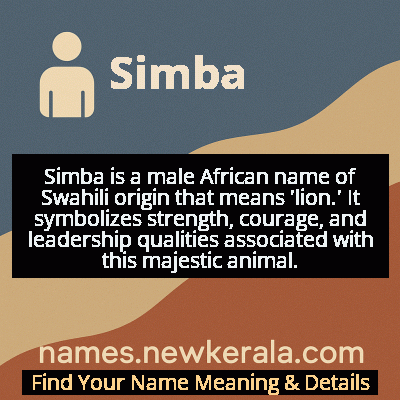Simba Name Meaning & Details
Origin, Popularity, Numerology Analysis & Name Meaning of Simba
Discover the origin, meaning, and cultural significance of the name SIMBA. Delve into its historical roots and explore the lasting impact it has had on communities and traditions.
Name
Simba
Gender
Male
Origin
African
Lucky Number
8
Meaning of the Name - Simba
Simba is a male African name of Swahili origin that means 'lion.' It symbolizes strength, courage, and leadership qualities associated with this majestic animal.
Simba - Complete Numerology Analysis
Your Numerology Number
Based on Pythagorean Numerology System
Ruling Planet
Saturn
Positive Nature
Ambitious, efficient, realistic, and authoritative.
Negative Traits
Materialistic, stressed, confrontational, and can be overly ambitious.
Lucky Colours
Dark blue, black.
Lucky Days
Saturday.
Lucky Stones
Blue sapphire, amethyst.
Harmony Numbers
2, 4, 6.
Best Suited Professions
Business leaders, managers, financial services, law enforcement.
What People Like About You
Leadership, determination, organizational skills.
Famous People Named Simba
Simba Makoni
Politician
Former Zimbabwean Minister of Finance and presidential candidate
Simba Sithole
Footballer
Zimbabwean professional footballer who played for various European clubs
Simba Chikore
Pilot/Businessman
Former commercial pilot and son-in-law of former Zimbabwean President Robert Mugabe
Simba Marumo
Musician
South African gospel singer and worship leader
Name Variations & International Equivalents
Click on blue names to explore their detailed meanings. Gray names with will be available soon.
Cultural & Historical Significance
In contemporary contexts, Simba has become a symbol of African pride and cultural identity. The name's association with strength and leadership has made it popular among parents who wish to instill these values in their children. During periods of political and social change in various African nations, names like Simba have taken on additional significance as expressions of cultural resilience and self-determination. The widespread recognition of the name through global media has also created a bridge between traditional African cultures and the wider world, making Simba an ambassador of African linguistic and cultural heritage on the international stage.
Extended Personality Analysis
Individuals named Simba are often perceived as natural leaders with strong, charismatic personalities. They tend to exhibit confidence, courage, and a protective nature toward their loved ones, much like the lion that inspires their name. These individuals typically possess a regal bearing and command respect in social and professional settings. Their leadership qualities are often complemented by loyalty to their family and community, demonstrating the same protective instincts that lion prides show toward their members. People with this name frequently display determination and resilience when facing challenges, refusing to back down from difficult situations. They may also have a strong sense of justice and fairness, often taking on the role of mediator or protector in group dynamics.
Beyond the obvious strength and leadership associations, those named Simba often develop a balanced personality that combines authority with compassion. While they can be assertive and dominant when necessary, they typically balance this strength with emotional intelligence and care for those in their inner circle. This duality reflects the complex social structure of lion prides, where strength serves the purpose of community protection rather than mere dominance. Many Simbas grow into roles where they mentor others or take responsibility for group welfare, naturally assuming positions of influence while maintaining humility about their capabilities. The name seems to inspire a sense of purpose and responsibility that shapes the character development of those who bear it throughout their lives.
Modern Usage & Popularity
In contemporary times, Simba has gained international recognition primarily due to Disney's 'The Lion King' franchise, which introduced the name to global audiences. While it remains most popular in East African countries like Tanzania, Kenya, and the Democratic Republic of Congo, the name has seen increased usage in African diaspora communities worldwide. Modern parents often choose Simba for its strong, positive connotations of leadership and strength, as well as its connection to African heritage. The name maintains cultural authenticity while being easily pronounceable in many languages, contributing to its cross-cultural appeal. In recent years, there has been a resurgence of interest in African names as people seek to reconnect with their cultural roots, and Simba stands out as both traditional and contemporary. Social media and global connectivity have further popularized the name beyond its traditional regions, with usage appearing in North America, Europe, and other regions where African cultural influence is growing.
Symbolic & Spiritual Meanings
Symbolically, Simba represents much more than just the literal meaning of 'lion.' It embodies concepts of kingship, authority, and natural leadership. The lion in African symbolism is often seen as a guardian and protector of communities, making the name synonymous with safety and security. Metaphorically, Simba suggests someone who stands firm in their convictions, possesses inner strength during adversity, and commands respect through natural authority rather than forced dominance. The name also symbolizes family loyalty and community responsibility, reflecting the social structure of lion prides where members work together for mutual benefit. In many African traditions, the lion represents the connection between the physical and spiritual worlds, making Simba a name that bridges earthly strength with higher purpose. The symbolic meaning extends to represent resilience, as lions are known for their ability to survive and thrive in challenging environments, much like the enduring spirit that the name inspires in those who bear it.

